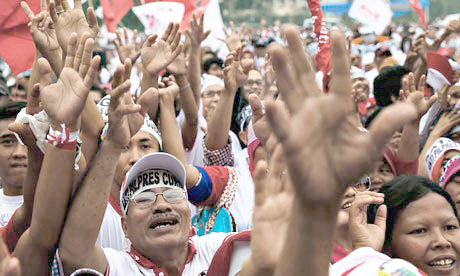Five reasons why Indonesia’s presidential election matters
Five reasons why Indonesia’s presidential election matters
1.Mega democracy
Indonesia is the world’s third largest democracy, with 187 million voters, including 67 million first-time voters. The incumbent, Susilo Bambang Yudhoyono, is the fourth president since the fall of the former authoritarian ruler Suharto in 1998 – and the first to have been directly elected. After serving a maximum two five-year terms in office Yudhoyono is ineligible to seek a third term. This is the first time power will be handed from one directly elected president to another.
2.Healthy economy
Indonesia is an increasingly important economy. Crippled by the Asian financial crisis of 1998, today it is south-east Asia’s largest economy, a member of G20 and one of the best performing economies globally. Counted among the Mints (Mexico, Indonesia, Nigeria and Turkey), a new group of emerging market economies, Indonesia’s economy is projected to be the seventh largest globally by 2030. Over recent years, the country has returned to investment grade, and sustained strong growth throughout the global recession, largely on the back of healthy domestic consumption. Its GDP growth is forecast to be 5.7% this year and picking up further in 2015. However, around 32 million Indonesians still live below the poverty line and the country’s economic potential is held by back by high levels of corruption and infrastructure bottlenecks.
3.Dynamic society
As a military coup undermines the political stability of Thailand, and questions persist about quasi one-party-rule in Malaysia and Singapore, Indonesia’s democratic transition has largely been hailed as successful. Since the fall of Suharto, and the end of his nepotistic 31 years in power, Indonesia has moved from centralised rule to a boisterous democracy. Vote buying and “money politics” have marred past votes, but the country’s elections are largely free and fair and the country boasts a dynamic civil society and one of the most vibrant and critical press corps in Asia.
In a parliament that is dominated by individuals who rose to prominence during the Suharto era, corruption remains a huge problem. But the country’s anti-corruption body, the KPK, has made incredible gains. The “graftbusters” have jailed some high-profile politicians and figures in recent years, just this week putting Akil Mochtar, the former head of the constitutional court, behind bars for life.
4.Moderate Islam
With a population of 240 million people, 90% of whom are Muslim, is often held up, alongside Turkey, as an example of the compatibility of democracy and Islam. Though the Middle East may be the centre of gravity for the Islamic world, Indonesia has more Muslims than that entire region. Since the fall of Suharto, when both political and religious freedoms were curtailed, democracy and Islam have thrived. Muslims in Indonesia predominately practise a moderate form of Islam, and during recent years the government has worked hard to cripple extremist groups, such as those behind the 2002 Bali bombings. Indonesia’s constitution protects religious freedom but under Yudhoyono – whose coalition includes Islamic-based parties – religious intolerance against Christians, Shia Muslims and Ahmadis has been on the rise.
5.National unity
Poised to play a greater role on the global stage, politically and economically, Indonesia needs a leader who can unify one of the world’s most diverse nations. This is a country that stretches across more than 17,000 islands, with hundreds of ethnic groups and languages – and yet has held together well since its foundation in 1945. In a globalised world beset by schism, separatism and break-up, it stands as an example of the benefits of togetherness. Both leading candidates have a nationalist thread to their argument. Whichever wins, the world may face a more assertive, determined Indonesia after 9 July.
Source: Kate Lamb / theguardian


